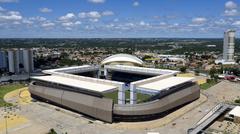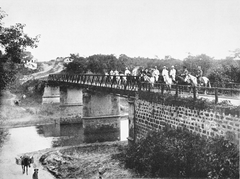
Casa Dom Aquino: Visiting Hours, Tickets, and Historical Sites in Cuiabá, Brazil
Date: 03/07/2025
Introduction: Casa Dom Aquino’s Legacy in Cuiabá
Casa Dom Aquino, gracefully set along the banks of the Cuiabá River in the heart of Mato Grosso’s capital, stands as a vital emblem of Brazil’s colonial, natural, and cultural heritage. Constructed in 1842 as the main residence of the influential Fazenda Bela Vista, this landmark’s adobe walls and clay-tiled roof have witnessed the city’s transformation from a rural stronghold to a vibrant urban center. Once home to prominent families such as the Murtinhos and, most notably, Francisco de Aquino Correia—Dom Aquino, an archbishop, governor, and poet—the house now serves as the Museu de História Natural de Mato Grosso (MHNMT).
Today, Casa Dom Aquino is a unique blend of preserved colonial architecture and immersive museum exhibits, featuring archaeological, paleontological, and ethnological collections that narrate the story of Mato Grosso’s ancient past and indigenous cultures. Managed by Instituto Ecoss since 1998 and protected as a heritage site since 1997, it offers guided tours, educational programs, and cultural events for visitors of all ages. For the latest information, visit Museu de História Natural MT and Portal Mato Grosso.
Table of Contents
- Welcome to Casa Dom Aquino
- Visitor Information
- Historical Background
- Archaeological Discoveries and Museum Transformation
- Travel Tips
- Nearby Attractions
- Frequently Asked Questions (FAQ)
- Visuals and Media
- Timeline of Key Events
- Legacy
- Contact and Further Information
Welcome to Casa Dom Aquino: Cuiabá’s Premier Historical Site
Casa Dom Aquino is among Cuiabá’s most prized historical sites, inviting visitors to step into a rich past shaped by colonial architecture, prominent local figures, and vibrant cultural traditions. Whether you’re a history buff, an architecture enthusiast, or a cultural traveler, this comprehensive guide covers all the essentials for visiting Casa Dom Aquino: hours, ticketing, accessibility, and nearby sights.
Visitor Information
Opening Hours
- General Hours: Tuesday to Sunday, 9:00 AM – 5:00 PM
- Closed: Mondays and public holidays
Note: Some sources may list slightly different opening hours (e.g., Wednesday to Sunday, 8:00 AM – 6:00 PM). Always confirm on the official website before planning your visit.
Ticket Prices
- Admission: Free for all visitors
- Guided Tours: Available upon request; group tours require advance booking
- Special Groups: Admission and tour rates for educational or technical groups can be arranged in advance
Guided Tours
- Tours are available in Portuguese and English and can be booked through the museum’s website or at the reception.
- Guided experiences offer deeper insight into the history, architecture, and archaeological collections.
Historical Background
Origins and Early Ownership
Built in 1842 by the Murtinho family, Casa Dom Aquino originally served as the main house of Fazenda Bela Vista, a significant rural estate on the Cuiabá River. Its riverside location was strategic for agricultural and social activities in 19th-century Mato Grosso. The residence is also notable as the birthplace of Joaquim Murtinho, a key figure in Brazilian politics and medicine.
Transition to the Aquino Correia Family
In the late 1800s, the Aquino Correia family became the property’s new stewards. Francisco de Aquino Correia—Dom Aquino—was born here in 1885. He became an archbishop, governor, poet, and the first Mato-Grossense member of the Brazilian Academy of Letters. His multifaceted legacy is closely tied to the house’s identity.
Architectural Features and Preservation
Casa Dom Aquino is the only extant 19th-century residence in Cuiabá preserving original colonial features: thick adobe walls, clay-tiled roof, and a distinctive U-shaped floor plan with a dozen rooms facing the river. The house was recognized as a protected heritage site in 1997, ensuring its continued restoration and public accessibility.
Archaeological Discoveries and Museum Transformation
Since 1998, the Instituto Ecoss has overseen Casa Dom Aquino’s transformation into a museum. Archaeological excavations have uncovered ceramics, coins, glassware, and other artifacts from the 18th and 19th centuries, enriching the museum’s collection. In 2006, it opened as Museu de Pré-História Casa Dom Aquino, becoming the Museu de História Natural de Mato Grosso (MHNMT) in 2016.
The museum’s exhibitions span archaeology, paleontology, and ethnology, with highlights including fossils of Pampatherium humboldti, Eremotherium laurillardi, and regional dinosaurs, as well as indigenous artifacts and immersive reconstructions of prehistoric life (Portal Mato Grosso).
Travel Tips
- Getting There: Centrally located in Cuiabá, accessible via public transport or taxi.
- Parking: Limited street parking; consider public transport for convenience.
- Accessibility: Ramps and accessible restrooms are available for visitors with disabilities. Contact the museum for specific needs.
- Best Time to Visit: Mornings on weekdays are quieter.
Nearby Attractions
- Cuiabá Cathedral: Historic church within walking distance.
- Pantanal Museum: Explore the biodiversity of the Pantanal wetlands.
- Mercado do Porto: Sample regional foods and crafts.
- Igreja do Rosário, Mercado Central, Museu do Rio Cuiabá: Additional cultural sites nearby.
Frequently Asked Questions (FAQ)
Q: What are the museum’s opening hours?
A: Tuesday to Sunday, 9:00 AM–5:00 PM (verify on official website).
Q: Is admission free?
A: Yes, entry is free for all visitors.
Q: Are guided tours available?
A: Yes. Book in advance for group tours.
Q: Is the site accessible for people with disabilities?
A: Yes, with ramps and accessible restrooms.
Q: Can I take photos inside the museum?
A: Photography is permitted in most areas; flash and tripods are not allowed.
Q: What other attractions are nearby?
A: The Cuiabá Cathedral, Pantanal Museum, Mercado do Porto, and other historical sites.
Visuals and Media
The museum features detailed displays and multimedia presentations. Virtual tours and high-quality images are available on the official museum website.
[Insert image: Casa Dom Aquino facade with alt text “Casa Dom Aquino Colonial Building in Cuiabá”]
[Insert image: Archaeological artifacts discovered at Casa Dom Aquino with alt text “18th-century ceramics and coins found at Casa Dom Aquino”]
Timeline of Key Events
- 1842: Construction by the Murtinho family
- 1848: Birth of Joaquim Murtinho
- 1885: Birth of Dom Aquino Corrêa
- 1950s: Functioned as a soap factory
- 1970s: Headquarters of Associação Atlética Banco do Brasil (AABB)
- 1980s: Occupied by homeless families
- 1997: Declared a protected heritage site
- 1998: Archaeological research initiated by Instituto Ecoss
- 2006: Opened as Museu de Pré-História Casa Dom Aquino
- 2016: Renamed Museu de História Natural de Mato Grosso
Legacy
Casa Dom Aquino encapsulates Cuiabá’s historical evolution and Mato Grosso’s diverse cultural heritage. Its preservation as a museum enables visitors to connect with both the architectural splendor and the region’s archaeological, paleontological, and ethnological treasures.
Contact and Further Information
For the latest updates, exhibitions, and visitor services, consult the Museu de História Natural MT official website.
Contact: (65) 3634-4858 | [email protected]
References
Plan Your Visit
Download the Audiala app for guided tours, interactive maps, and exclusive content. Stay up to date by following Casa Dom Aquino and Museu de História Natural de Mato Grosso on social media for news, exhibitions, and travel tips.


